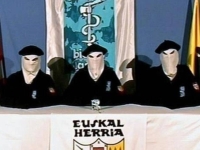Politics
Spain, ten years without E.T.A.
A decade ago, terrorism end
USPA NEWS -
Ten years ago, on October 20, 2011, the terrorist organization E.T.A. announced the end of his criminal activities. Born in the Basque Country, a region in Northern Spain, at the time of the dictatorship of General Francisco Franco, the band put an end to sixty years of armed struggle during which it caused the death of 853 people - mainly politicians, police officers and the military, although also civilians and even children - in more than 3,500 attacks. With a cost of 25,000 million euros (29,118.73 million dollars at the current exchange rate).
Ten years after the end of the terrorist organization E.T.A., when 200 of its militants are serving sentences in Spanish prisons, the division between the Government, the opposition and associations of victims of terrorism is more evident than ever. This Wednesday, the day of the tenth anniversary of the end of the Basque terrorist violence, the Spanish Congress of Deputies was unable to approve a unanimous declaration against terrorism. In an atmosphere rarefied by the statements, a day before, of the former member of E.T.A. and current leader of the political formation heir to the Basque terrorist organization, Bildu, Arnaldo Otegi.
Otegi claimed Monday that E.T.A. it was something that nobody wanted, that "should never have happened." A day later, before his own co-religionists, the Basque independence leader explained that his objective is to achieve the release of the 200 prisoners of the terrorist organization and conditioned Bildu's support for the General State Budgets on the achievement of said objective. "If to achieve the release of the prisoners it is necessary to support the budgets, we will support them," he said.
Words that managed to put pressure on the Government of the socialist Prime Minister Pedro Sanchez, who needs Bildu's votes, among other Basque and Catalan independence and nationalist parties, to carry out their state budgets.
Asked in the Congress of Deputies about the hypothetical negotiations that the Sanchez Government is holding with the Basque independence activists, the Prime Minister was resounding in stating that "there is no negotiation of the budgets for prisoners" of E.T.A. An explanation that does not convince the opposition in Parliament. Nor to the associations of victims of terrorism, who feel betrayed by the Spanish Government.
As politicians get into fights over responsibility for the end of E.T.A. -the organization put an end to its criminal activity during the mandate of the socialist Jose Luis Rodriguez Zapatero-, the experts in the fight against terrorism coincide in pointing out that E.T.A. it was defeated by a joint action of the Police and the courts. Surrounded by the Police, the Civil Guard, the Spanish Intelligence Service and the judges, and with two hundred of its members in jail, without the reference of other organizations such as the Irish IRA, with which they collaborated, which had ceased their activity previously, the Basque terrorist organization only had to hand over their weapons. Ten years later, the Basque Country has recovered the peace that was forbidden to it for six decades.
Liability for this article lies with the author, who also holds the copyright. Editorial content from USPA may be quoted on other websites as long as the quote comprises no more than 5% of the entire text, is marked as such and the source is named (via hyperlink).






